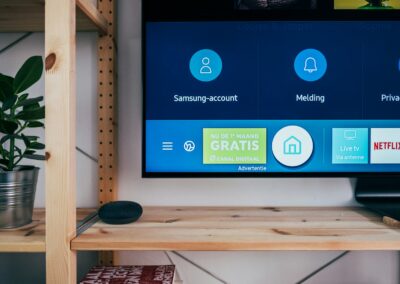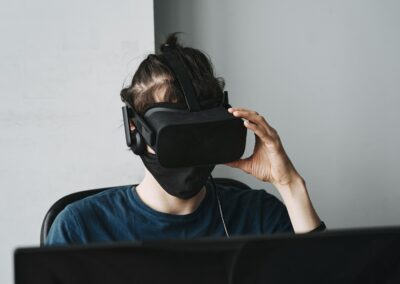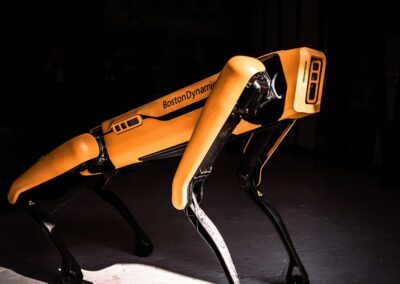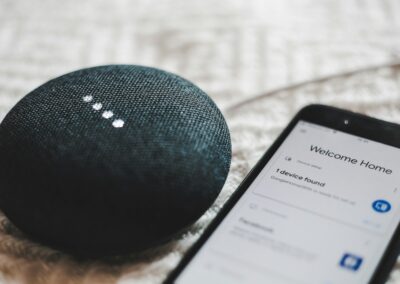The Role of Smart Home Technologies in Enhancing Accessibility
Introduction to Accessibility in Smart Homes
One of the most significant advancements in this realm is the enhancement of accessibility in smart homes for individuals with disabilities or special needs. By leveraging Artificial Intelligence (AI), the Internet of Things (IoT), and innovative design, smart homes can provide a more inclusive environment, promoting independence and improving the quality of life for all residents. In regions like Saudi Arabia and the UAE, where cities such as Riyadh and Dubai are at the forefront of technological innovation, integrating these solutions into the urban landscape is crucial for fostering inclusivity and progress.
Smart Home Technologies Transforming Accessibility
Smart home technologies are transforming accessibility by offering tailored solutions that cater to the unique needs of individuals with disabilities. Voice-activated assistants, such as Amazon’s Alexa and Google Home, allow users to control various home functions using simple voice commands, eliminating the need for physical interaction with devices. This is particularly beneficial for individuals with mobility impairments, enabling them to operate lights, appliances, and security systems effortlessly.
In Riyadh, initiatives to incorporate smart home technologies into urban planning are underway, aiming to create more accessible living spaces. These technologies include smart doorbells with video capabilities that allow residents to see and communicate with visitors without physically approaching the door, enhancing security and convenience. Additionally, automated lighting systems that adjust based on occupancy and time of day ensure that homes are always well-lit, reducing the risk of accidents for individuals with visual impairments.
Dubai is also embracing smart home innovations to enhance accessibility. The city’s smart city initiatives focus on integrating IoT devices that offer real-time monitoring and control of home environments. For example, smart thermostats can learn the preferences of residents and automatically adjust the temperature to create a comfortable living space. Such technologies not only promote independence but also contribute to energy efficiency, aligning with Dubai’s sustainability goals.
Promoting Independence through Home Automation
Home automation plays a pivotal role in promoting independence for individuals with disabilities. By automating routine tasks, smart homes can significantly reduce the need for assistance, empowering residents to manage their daily activities independently. Automated systems for opening and closing doors, adjusting window blinds, and controlling home entertainment systems provide a seamless and accessible living experience.
In Saudi Arabia, the adoption of smart home technologies is being driven by the government’s Vision 2030 initiative, which aims to enhance the quality of life for all citizens. As part of this vision, Riyadh is exploring the use of advanced home automation systems to support individuals with disabilities. These systems include motion sensors that can detect falls and alert emergency services, ensuring timely assistance and improving safety.
Dubai’s smart home projects also prioritize accessibility, with a focus on creating user-friendly interfaces and integrating assistive technologies. For example, smart kitchens equipped with adjustable countertops and voice-controlled appliances enable individuals with physical disabilities to cook and manage household tasks with ease. By fostering an environment of independence, these innovations contribute to the overall well-being and empowerment of residents.
Innovative Design Solutions for Inclusive Living
Designing Smart Homes for Accessibility
Innovative design solutions are essential for creating smart homes that are accessible to individuals with disabilities. Universal design principles, which emphasize accessibility for all, are increasingly being incorporated into smart home projects in Riyadh and Dubai. These principles ensure that homes are designed with the needs of all residents in mind, from wider doorways and ramps to accessible bathrooms and kitchens.
In Riyadh, developers are working with architects and designers to create smart home layouts that facilitate ease of movement and access. This includes integrating features such as adjustable-height countertops, lever-style door handles, and non-slip flooring. Additionally, smart home systems are being designed to be intuitive and easy to use, with clear interfaces and customizable settings that cater to individual preferences.
Dubai’s commitment to innovation extends to the design of accessible smart homes as well. The city’s ambitious urban planning projects include the development of smart communities that prioritize inclusivity. These communities feature interconnected smart homes with shared amenities that are accessible to all residents, fostering a sense of community and support. By incorporating universal design principles, Dubai is setting a benchmark for inclusive urban living.
Ensuring Security and Privacy in Accessible Smart Homes
Ensuring security and privacy in accessible smart homes is crucial for building trust and promoting widespread adoption. Smart home technologies must be equipped with robust security measures to protect against cyber threats and unauthorized access. For individuals with disabilities, maintaining privacy is particularly important, as they may rely on sensitive health-related data to manage their daily activities.
In Saudi Arabia, efforts are being made to develop comprehensive security protocols for smart homes. These protocols include encryption of data transmissions, secure authentication methods, and regular software updates to address vulnerabilities. By implementing these measures, Riyadh aims to create a safe and secure environment for all residents, enhancing their confidence in smart home technologies.
Dubai is also prioritizing security and privacy in its smart home projects. The city’s cybersecurity strategy includes guidelines for securing smart home networks and protecting resident data. This includes educating residents on best practices for maintaining security, such as using strong passwords and regularly updating device firmware. By fostering a culture of security awareness, Dubai ensures that its smart homes are not only accessible but also safe and secure.
Fostering Community Engagement and Support
Community engagement and support are vital for the successful implementation of accessible smart homes. Involving residents in the planning and development process ensures that their needs and preferences are considered, resulting in more effective and user-friendly solutions. Public consultations, focus groups, and pilot projects can provide valuable insights and feedback, guiding the design and deployment of smart home technologies.
In Riyadh, community engagement initiatives are being integrated into smart home projects to gather input from individuals with disabilities and their families. This collaborative approach ensures that the technologies and designs implemented are practical and beneficial. Additionally, support networks and resources are being established to assist residents in adopting and using smart home technologies effectively.
Dubai’s smart city initiatives also emphasize the importance of community engagement. The city is leveraging digital platforms and social media to communicate with residents, gather feedback, and share information about accessible smart home technologies. By creating a supportive and inclusive environment, Dubai is promoting the adoption of smart home solutions that enhance the quality of life for all residents.
Conclusion
Enhancing accessibility in smart homes through innovative technologies and design is transforming urban living in cities like Riyadh and Dubai. By leveraging AI, IoT, and home automation, smart homes are providing individuals with disabilities greater independence, convenience, and safety. Through inclusive design, robust security measures, and community engagement, these cities are setting new standards for accessible living. The continued focus on innovation and inclusivity will ensure that smart homes remain a cornerstone of modern, sustainable urban development.
#Accessibility #SmartHomes #TechnologyForDisabilities #HomeAutomation #AI #IoT #InclusiveDesign #RiyadhInnovation #DubaiTechnology























